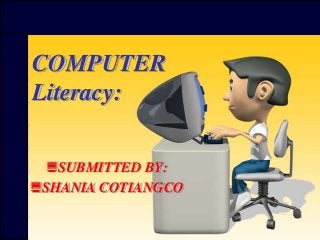
COMPUTER Literacy.
- 2. Information Literacy 2 What is Information Literacy? And why should I care? • Information literacy skills are skills you will need through your life. We are always seeking information. . . . Information helps us reach conclusions, make our choices, and communicate more effectively. But the good stuff is often buried in heaps of junk. We need to continue to improve our searching, evaluating and communication skills in a changing information environment. • Remember computer literacy is not information literacy. For a comparison, read this article.
- 3. March 22, 2014 Information Literacy 3 Why teach information literacy? • The information explosion has provided countless opportunities for students and has dramatically altered the knowledge and abilities they will need to live productively in the twenty-first century. Students must become skillful consumers and producers of information in a range of sources and formats to thrive personally and economically in the communication age.
- 4. March 22, 2014 Information Literacy 4 What is information literacy? If you are information literate, you are able to • know when you have a need for information • find the information you need • evaluate the information you find and use it effectively to meet your needs
- 5. March 22, 2014 Information Literacy 5 Another concept What is Information Competence? • information competence, at heart, is the ability to find, evaluate, use, and communicate information in all of its various formats. • the fusing or the integration of library literacy, computer literacy, media literacy, technological literacy, ethics, critical thinking, and communication skills.
- 6. March 22, 2014 Information Literacy 6 Literacy, Competence or Competency? Information literacy • also known as information competence or information competency is a set of skills that helps students sift through the mass of information now available to them in order to locate and retrieve what is relevant and reliable for their research needs. • Simply put, an information literate student understands how to find, retrieve, analyze, and use information effectively.
- 7. March 22, 2014 Information Literacy 7 Adding to the confusion of terms! Several other terms and combinations of terms have been also used by different authors: • ‘infoliteracy’, ‘informacy’, ‘information empowerment’, ‘information competence’, ‘information competency’, ‘information competencies’, ‘information literacy skills’, ‘information literacy and skills’, ‘skills of information literacy’, ‘information literacy competence’, ‘information literacy competencies’, ‘information competence skills’, ‘information handling skills’, ‘information problem solving’, ‘information problem solving skills’, ‘information fluency’, ‘information mediacy’ and even ‘information mastery’
- 8. March 22, 2014 Information Literacy 8 A related term often used outside library media circles • We learn best when we are at the center of our own learning. Inquiry-based learning is a learning process through questions generated from the interests, curiosities, and perspectives/experiences of the learner. When investigations grow from our own questions, curiosities, and experiences, learning is an organic and motivating process that is intrinsically enjoyable. • Inquiry-based learning
- 9. March 22, 2014 Information Literacy 9 Project, Problem, and Inquiry-based Learning Explore the Approaches • Project-based learning, problem- based learning, and inquiry-based learning all three closely relate to the information processing approach. They all fit well with technology-rich learning environments where the focus is not on the hardware and software, but on the learning experience.
- 10. March 22, 2014 Information Literacy 10 21st Century Literacies • 21st Century Literacies refer to the skills needed to flourish in today's society and in the future. Today discrete disciplines have emerged around information, media, multicultural, and visual literacies. It is the combination of literacies that can better help K-12 students and adult learners address and solve the issues that confront them. • http://www.kn.sbc.com/wired/21stcent/index.html
